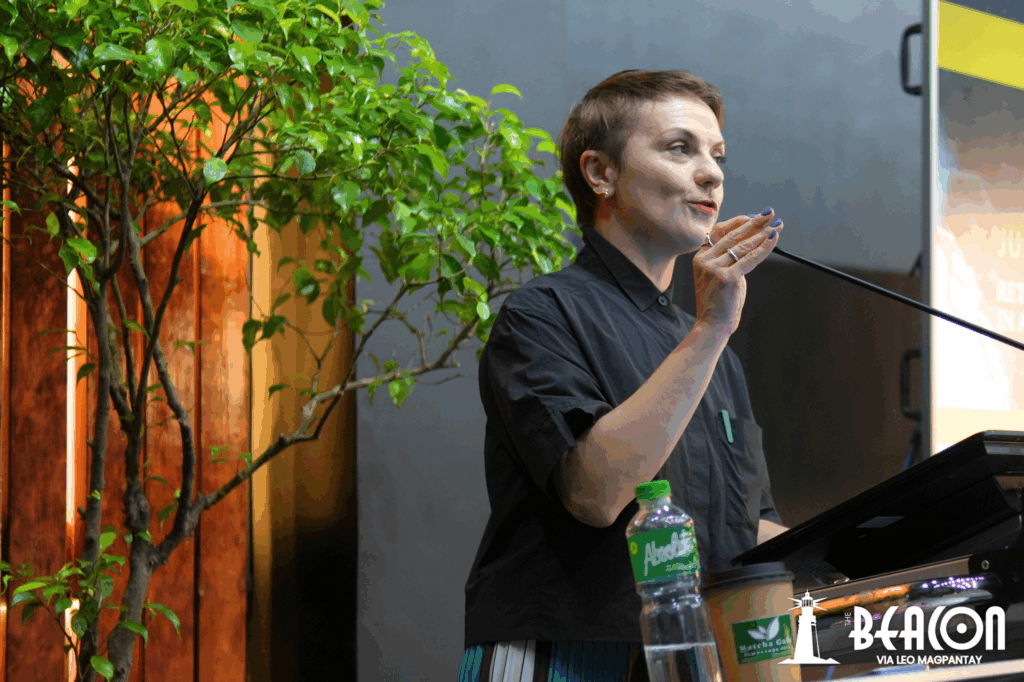By Safeeya Hamsirani, The BEACON

Photo by Leo Magpantay, The BEACON
In times of conflict, readers are bombarded with narratives of loss, which eventually can lead to empathy fatigue and gradual disengagement. Journalists who are on the frontlines covering such stories are no strangers to this.
Award-winning Ukrainian journalist Natalya Gumenyuk acknowledged the emotional challenge that conflict journalists face.
“You can be tired… but you cannot be tired of being inspired,” Gumenyuk stressed that inspirational people with stories of resilience can be the key to reaching communities beyond their own.
Ateneo de Zamboanga University (AdZU), Embassy of Ukraine in the Republic of the Philippines, and Public Interest Journalism Lab, collaborated for the workshop titled, “Justice as a Process: Rethinking Human Rights Journalism in a Polarised World,” on November 19, 2025, at Tee King Lecture Hall, AdZU-Salvador Campus.
AdZU Jesuit priests, School of Liberal Arts faculty, Bachelor of Arts in Communication and law students, college campus journalists, and other attendees from Western Mindanao State University, Zamboanga Peninsula Polytechnic State University, and Mujer-LGBT Organization gathered to reflect on the importance of promoting empathy in covering stories of conflict to combat the denial of viewers to such realities.
Gumenyuk presented two short documentaries that focused on the stories of war victims of Russia’s invasion of Ukraine. The first profiled firefighters who tragically transitioned from fighting fires to serving as first responders, losing colleagues and family members in the process. The second film sequentially depicted the lives of a young boxer who helped others escape and a mother of two whose husband was killed in an attack, both of whom chose to remain in their towns and adapt to their new normal.
When talking to victims about their trauma, she advised journalists to focus on their strengths to survive, “It’s not our victimhood, which define us Ukrainians. Our victims, [but] they are survivors and fighters… So I really encourage you when you speak about the people who suffer, see the strengths.”
By centering the narrative on the survivors as the protagonists and sidelining the perpetrators as the antagonists, the spotlight is intentionally redirected to telling stories of hope.
Gumenyuk added, “For the people, [because] sometimes for the survivors to tell the story, to know that it’s not forgotten, it’s a part of the justice as well,” highlighting that journalism must move past simply documenting tragedy; it must act as a watchdog to hold offenders accountable and prevent victims’ narratives from being silenced.
Fr. Guillrey Anthony “Ernald” M. Andal, SJ, AdZU President, opened the event by acknowledging the Zamboanga community’s shared experience with conflict and rebuilding, stating, “We may be far from Ukraine, but we are not strangers to conflict, to displacement, to loss…” to which he also added, “Justice begins with how we pay attention — not with big statements, not with any kind of dramatic moments.”
Following the documentaries, an open forum allowed attendees to engage in discussions about peace journalism and the difficulties encountered in practicing it, concluding with closing remarks from Br. Jeffrey Pioquinto, SJ. | via Safeeya Hamsirani, The BEACON


